Millions of Muslims around the world are observing the holy month of Ramadhaan.
Woman24 gives you an insightful and personal look at fasting during the month and what it entails…
Assalamu Alaikum Wa Rahmatullahi Wa Barakatuh, (May the peace, mercy, and blessings of Allah be with you).
Ramadhaan greetings to my fellow brothers, sisters and loved ones…
The holy month of Ramadhaan has dawned upon us, we were eased into it as it fell over the long weekend, but now I am at work feeling hungry and a bit ""dof"", as sleeping and eating patterns have changed. Feeling like this is only natural and in no way am I complaining. If the fast was easy then it wouldn't be as meaningful, to feel hunger pangs are completely natural and leads to a chain reaction.
What does the fast feel like?
Allow me to explain: when you are hungry or feel a bit ""off"" your initial thought is ""why am I feeling this way?” This immediately makes you think about Allah (God) and why you are fasting, which often leads to an understanding of the fast and an appreciation for the month. I see the fast as a spiritual detox. A time when you are cleansed and are constantly spiritually aware of your maker.
The holy month of Ramadhaan unites all Muslims in fasting, feasting, worship and prayer. It is a time for contemplation, spirituality and brotherhood. And in a critical time such as now where human rights are often overlooked, and images of suffering plague news channels from Palestine to Darfur, everybody should give fasting a try. To have an idea of what some people endure everyday.
Bottom line: as much as it may be hard to fathom, I don't mind feeling hungry because it makes me more conscious of the people around us who have no food or access to clean water.
A few things you might not know about Ramadhaan
• We fast from Dawn to Dusk.
• The Fast falls in the month of Ramadhaan the month of Taqwa, (to cleanse or purify the heart and the soul)
• Fasting is compulsory; it falls under the five pillars of Islam namely:
1. The Testimony of Faith, the declaration that there is none worthy of worship except Allah and that Muhammad (Peace Be upon Him) is His last messenger.
2. To give Zakah: (charity)
3. To perform the Hajj (pilgrimage to Mecca), compulsory once in a lifetime for one who has the ability to do it. If the Muslim is in ill health or in debt, he or she is not required to perform Hajj.
4. To perform the five daily Salaahs.
5. To fast in the holy month of Ramadhaan
How Ramadhaan affects our lives
It is expected of a Muslim to start fasting once they reach puberty. It is advisable that a child starts fasting from the age of seven years.
The month of Ramadhaan begins at the beginning of the lunar month. While fasting, Muslims abstain from food and water from sunrise until sunset.
Depending on the moon, Muslims fast for either 29 or 30 days. At the sighting of the next new moon, the month of Ramadhaan is over and the Muslim festivity of Eid is celebrated.
This month is so precious that one should fast, recite Quran and constantly be engaged in worship (Ibaadah). In this way, by giving preference to religion over self-desires, a person can acquire the Pleasure and Nearness of Allah. Each day and night of this blessed month can bring the reward of worship of years.
It is also advisable to abstain from watching television and to stay away from things that could lead you astray, such as slander, going to clubs and intoxication of any sort… During this period one should spiritually enrich the soul with reading from the Noble Quran to form a stronger bond with your maker and basically just try to stay on the straight and narrow.
The fast is broken at sunset at the call of prayer (the Athaan). It is advisable to break one's fast with three sips of water and a date. It is said to be ""Sunnah"", as the prophet (Peace Be Upon Him), broke his fast with a date and water. (Water lowers the acidic juices in the stomach and dates contain energy and nutrients which the body has lost throughout the day).
Why is Ramadhaan so holy?
Because, during this month…
• The whole Quran was sent down to the first sky.
• There is the night of Qadr (Power/Light), which is better than 1000 months.
• The reward of a good deed is equal to the reward of another whole month.
• The reward of patience is Jannah (Heaven).
• This month we are taught the lesson of kindness towards others.
• The daily bread of Muslims is increased.
• The first ten days are of mercy, second ten days are of forgiveness and the last ten days are of being freed from Hell.
The month of Ramadhaan is a month in which the Mercy and Blessings of Allah descend upon us continuously.
To all our Muslim readers, we wish you well over this auspicious month"


0 Comments